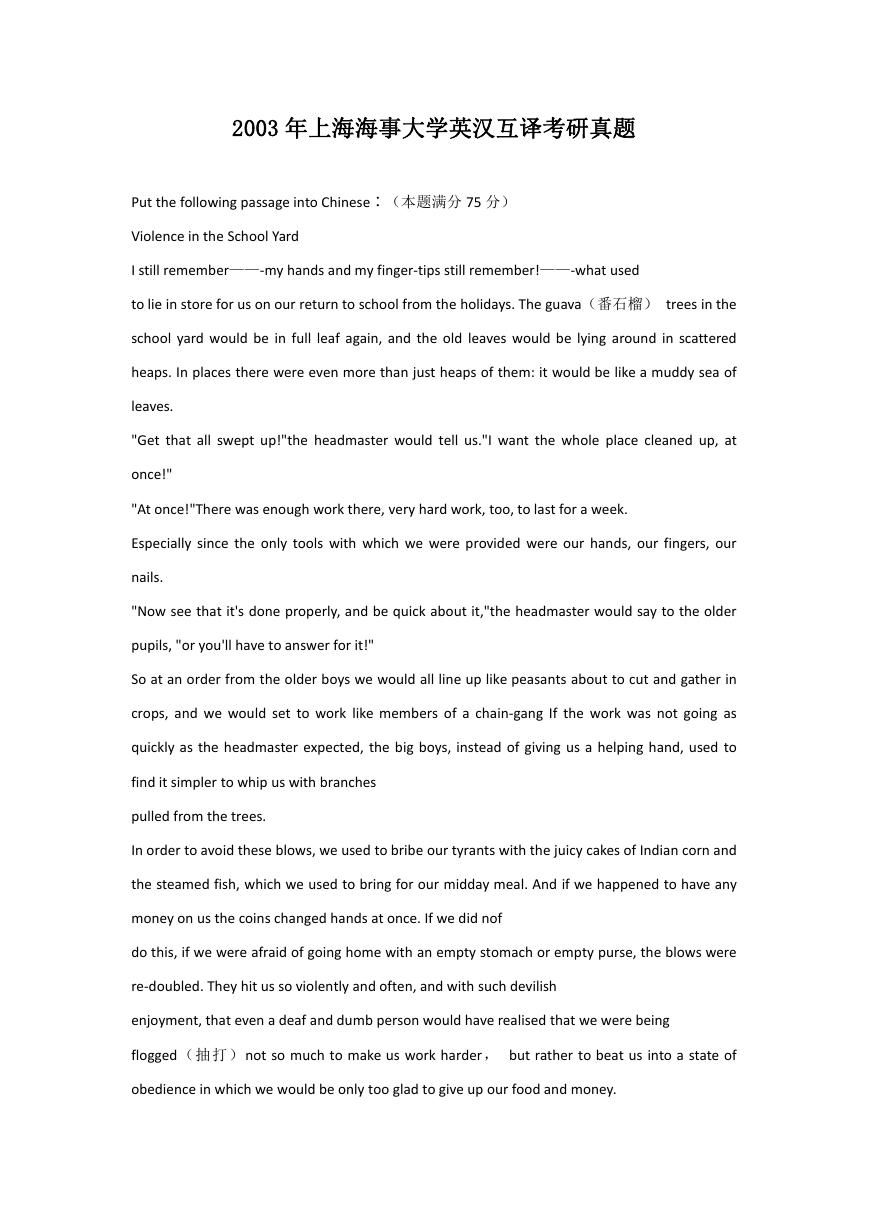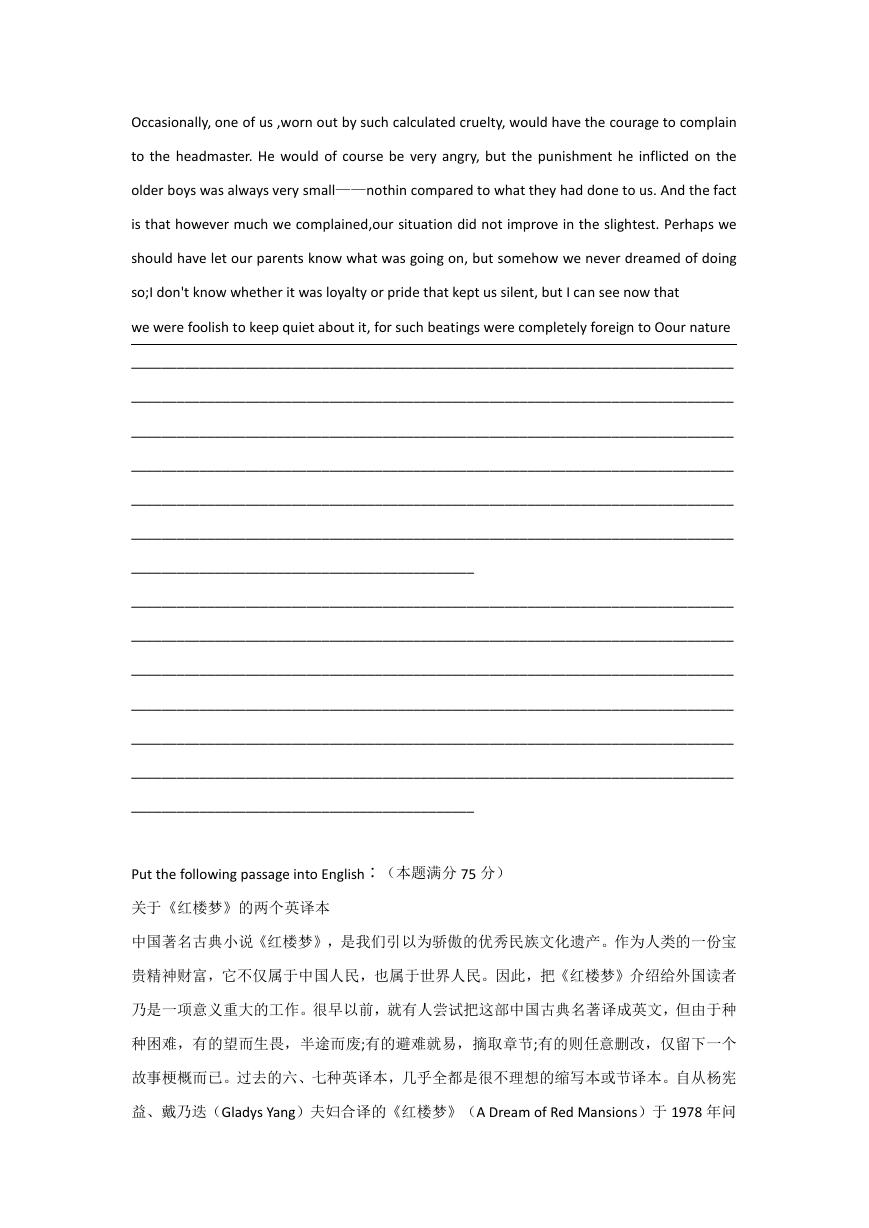2003 年上海海事大学英汉互译考研真题
Put the following passage into Chinese∶(本题满分 75 分)
Violence in the School Yard
I still remember——-my hands and my finger-tips still remember!——-what used
to lie in store for us on our return to school from the holidays. The guava(番石榴) trees in the
school yard would be in full leaf again, and the old leaves would be lying around in scattered
heaps. In places there were even more than just heaps of them: it would be like a muddy sea of
leaves.
"Get that all swept up!"the headmaster would tell us."I want the whole place cleaned up, at
once!"
"At once!"There was enough work there, very hard work, too, to last for a week.
Especially since the only tools with which we were provided were our hands, our fingers, our
nails.
"Now see that it's done properly, and be quick about it,"the headmaster would say to the older
pupils, "or you'll have to answer for it!"
So at an order from the older boys we would all line up like peasants about to cut and gather in
crops, and we would set to work like members of a chain-gang If the work was not going as
quickly as the headmaster expected, the big boys, instead of giving us a helping hand, used to
find it simpler to whip us with branches
pulled from the trees.
In order to avoid these blows, we used to bribe our tyrants with the juicy cakes of Indian corn and
the steamed fish, which we used to bring for our midday meal. And if we happened to have any
money on us the coins changed hands at once. If we did nof
do this, if we were afraid of going home with an empty stomach or empty purse, the blows were
re-doubled. They hit us so violently and often, and with such devilish
enjoyment, that even a deaf and dumb person would have realised that we were being
flogged(抽打)not so much to make us work harder, but rather to beat us into a state of
obedience in which we would be only too glad to give up our food and money.
�
Occasionally, one of us ,worn out by such calculated cruelty, would have the courage to complain
to the headmaster. He would of course be very angry, but the punishment he inflicted on the
older boys was always very small——nothin compared to what they had done to us. And the fact
is that however much we complained,our situation did not improve in the slightest. Perhaps we
should have let our parents know what was going on, but somehow we never dreamed of doing
so;I don't know whether it was loyalty or pride that kept us silent, but I can see now that
we were foolish to keep quiet about it, for such beatings were completely foreign to Oour nature
_______________________________________________________________________________
_______________________________________________________________________________
_______________________________________________________________________________
_______________________________________________________________________________
_______________________________________________________________________________
_______________________________________________________________________________
_____________________________________________
_______________________________________________________________________________
_______________________________________________________________________________
_______________________________________________________________________________
_______________________________________________________________________________
_______________________________________________________________________________
_______________________________________________________________________________
_____________________________________________
Put the following passage into English∶(本题满分 75 分)
关于《红楼梦》的两个英译本
中国著名古典小说《红楼梦》,是我们引以为骄傲的优秀民族文化遗产。作为人类的一份宝
贵精神财富,它不仅属于中国人民,也属于世界人民。因此,把《红楼梦》介绍给外国读者
乃是一项意义重大的工作。很早以前,就有人尝试把这部中国古典名著译成英文,但由于种
种困难,有的望而生畏,半途而废;有的避难就易,摘取章节;有的则任意删改,仅留下一个
故事梗概而已。过去的六、七种英译本,几乎全都是很不理想的缩写本或节译本。自从杨宪
益、戴乃迭(Gladys Yang)夫妇合译的《红楼梦》(A Dream of Red Mansions)于 1978 年问
�
世以来,才有了第一个令人满意的英文全译本。
杨译《红楼梦》把原著毫无遗漏地译了出来,而且行文流畅,语言优美,确是一部不可多得
的精湛译本。原书结构庞大,包罗万象;成语典故,比比皆是,再加上穿插其间的大量诗词,
往往给译者造成许多棘手的难点。然而,老翻译家杨宪益、戴乃迭能以高超的翻译技巧,成
功地处理了这些难点,确定令人赞叹不已。
《红楼梦》的第二个英文全译本于 1986 年出版,由牛津大学退休教授戴维·霍克斯(David
Hawks)与女婿约翰·民福德(John Minford)合译,定名为《石头记》(The Story of the Stone)。
该译本也受到西方广大读者的欢迎。
_______________________________________________________________________________
_______________________________________________________________________________
_______________________________________________________________________________
_______________________________________________________________________________
_______________________________________________________________________________
_______________________________________________________________________________
_______________________________________________________________________________
_______________________________________________________________________________
_______________________________________________________________________________
_______________________________________________________________________________
_______________________________________________________________________________
_______________________________________________________________________________
_______________________________________________________________________________
___________
�






 2023年江西萍乡中考道德与法治真题及答案.doc
2023年江西萍乡中考道德与法治真题及答案.doc 2012年重庆南川中考生物真题及答案.doc
2012年重庆南川中考生物真题及答案.doc 2013年江西师范大学地理学综合及文艺理论基础考研真题.doc
2013年江西师范大学地理学综合及文艺理论基础考研真题.doc 2020年四川甘孜小升初语文真题及答案I卷.doc
2020年四川甘孜小升初语文真题及答案I卷.doc 2020年注册岩土工程师专业基础考试真题及答案.doc
2020年注册岩土工程师专业基础考试真题及答案.doc 2023-2024学年福建省厦门市九年级上学期数学月考试题及答案.doc
2023-2024学年福建省厦门市九年级上学期数学月考试题及答案.doc 2021-2022学年辽宁省沈阳市大东区九年级上学期语文期末试题及答案.doc
2021-2022学年辽宁省沈阳市大东区九年级上学期语文期末试题及答案.doc 2022-2023学年北京东城区初三第一学期物理期末试卷及答案.doc
2022-2023学年北京东城区初三第一学期物理期末试卷及答案.doc 2018上半年江西教师资格初中地理学科知识与教学能力真题及答案.doc
2018上半年江西教师资格初中地理学科知识与教学能力真题及答案.doc 2012年河北国家公务员申论考试真题及答案-省级.doc
2012年河北国家公务员申论考试真题及答案-省级.doc 2020-2021学年江苏省扬州市江都区邵樊片九年级上学期数学第一次质量检测试题及答案.doc
2020-2021学年江苏省扬州市江都区邵樊片九年级上学期数学第一次质量检测试题及答案.doc 2022下半年黑龙江教师资格证中学综合素质真题及答案.doc
2022下半年黑龙江教师资格证中学综合素质真题及答案.doc